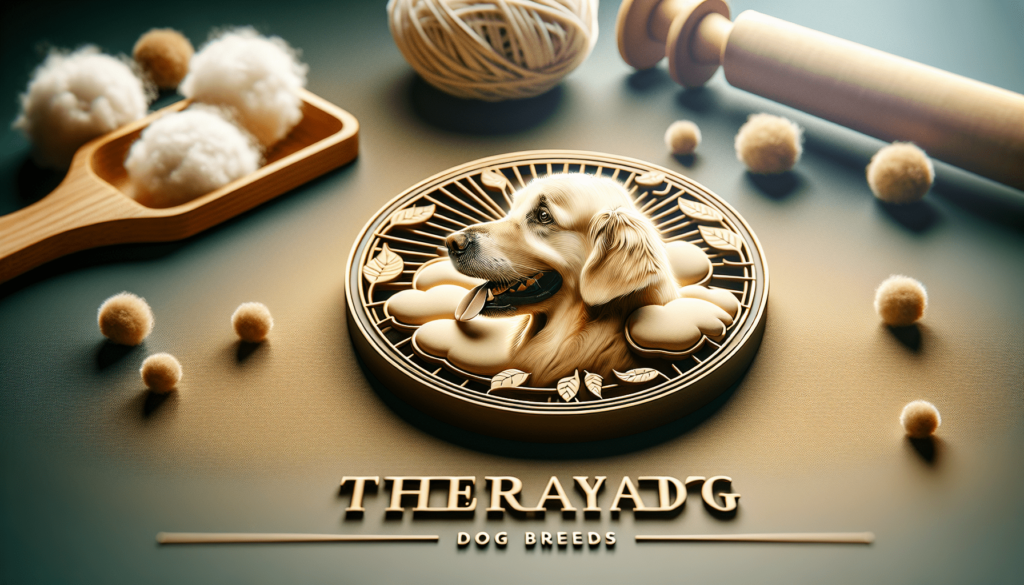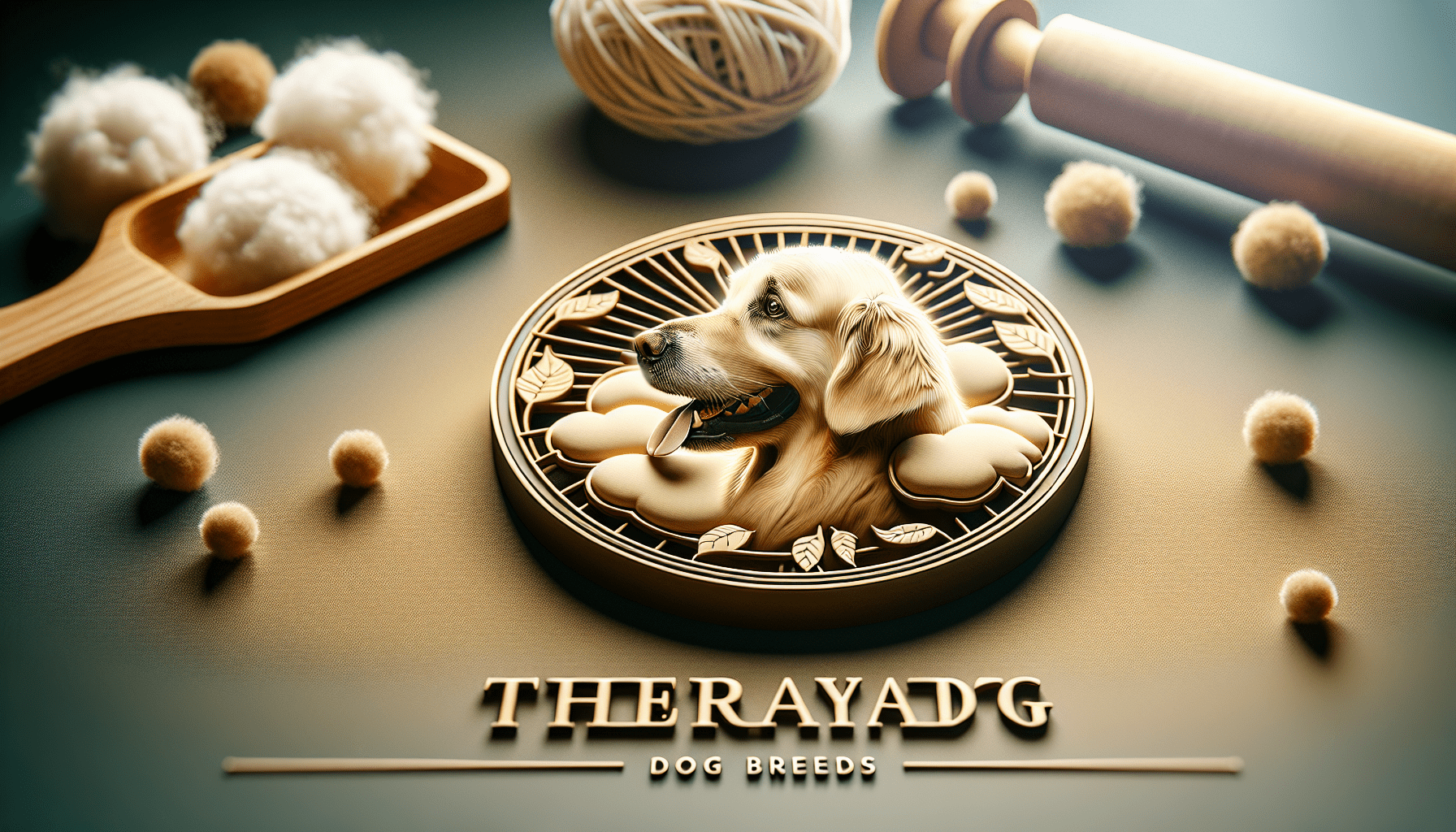Have you ever wondered which dog breeds are the best for providing therapy and emotional support? Look no further! In this article, we will explore some of the top dog breeds that excel in these roles. Whether you are seeking a furry companion to help alleviate stress and anxiety, or assist in therapy sessions, these breeds have the perfect blend of temperament, intelligence, and loyalty to make a positive impact in your life. So, let’s dive in and discover which dogs are the most suitable for providing therapy and emotional support!

Benefits of Therapy and Emotional Support Dogs
Therapy dogs and emotional support dogs provide invaluable support and comfort to individuals who may be dealing with various mental health issues or emotional distress. These dogs offer unconditional love, companionship, and a non-judgmental presence that can greatly assist in improving the overall well-being of their owners. The benefits of having a therapy or emotional support dog are numerous, and they can have a significant positive impact on your life.
One of the key benefits of therapy and emotional support dogs is the fact that they can help reduce feelings of stress, anxiety, and depression. Dogs are known for their ability to sense and respond to emotions, and they have a unique way of calming and comforting their owners. Spending time with a therapy or emotional support dog can help lower blood pressure, reduce heart rate, and release endorphins, which are natural mood enhancers.
Another important benefit of having a therapy or emotional support dog is the increased social interaction and sense of purpose they provide. These dogs can encourage their owners to engage in physical activity, such as walks or playtime, which not only promotes physical health but also creates opportunities for social interaction with other dog owners. Additionally, therapy dogs are often welcomed in various public settings, such as schools, workplaces, and hospitals, where they can provide comfort and companionship to those in need.
Choosing the right breed of dog for therapy or emotional support is crucial in ensuring a successful and fulfilling relationship. Factors such as lifestyle, size, temperament, and personality should all be taken into consideration when selecting a dog breed.
Choosing the Right Breed
Consider Your Lifestyle
When choosing a breed, it is important to consider your lifestyle and daily routine. Some breeds may require more exercise and mental stimulation than others, so it is essential to choose a dog that fits well with your lifestyle. For example, if you are an active person who enjoys outdoor activities, a high-energy breed like a Labrador Retriever or a Golden Retriever may be a good fit. On the other hand, if you live in an apartment or have limited space, a smaller breed like a Cavalier King Charles Spaniel or a Bichon Frise may be more suitable.
Size Matters
The size of the dog is another important factor to consider. Larger breeds may provide a greater sense of security and physical support, especially for individuals who may have mobility issues. However, smaller breeds can also be effective therapy or emotional support dogs, especially in situations where space is limited. Ultimately, the size of the dog should be chosen based on your personal preferences and needs.
Temperament and Personality
The temperament and personality of a dog are crucial when considering them as therapy or emotional support animals. Therapy dogs should be calm, patient, and friendly, with a natural inclination to bond with humans. They should be well-behaved and adaptable to various environments and situations. Emotional support dogs, on the other hand, should be able to provide comfort and support to their owners at all times, displaying a gentle and nurturing nature. Breeds such as the Labrador Retriever, Golden Retriever, and Cavalier King Charles Spaniel are known for their friendly and patient personalities, making them ideal choices for therapy or emotional support roles.
Top Therapy Dog Breeds
Therapy dogs are trained to provide comfort and emotional support to individuals in various settings, such as hospitals, nursing homes, and schools. These dogs have a naturally calm and friendly disposition and are able to establish a positive rapport with different individuals, including children, the elderly, and those with disabilities. Some of the top therapy dog breeds include:
Golden Retriever
Golden Retrievers are known for their gentle and friendly nature, making them excellent candidates for therapy work. They are highly trainable and can easily adapt to different environments and situations. Their calm demeanor and natural affinity for human interaction make them ideal therapy dogs.
Labrador Retriever
Labrador Retrievers are one of the most popular breeds for therapy work. They are intelligent, friendly, and eager to please, making them highly responsive to training. Their outgoing and affectionate nature enables them to form strong bonds with individuals, providing comfort and support in therapy settings.
Cavalier King Charles Spaniel
Cavalier King Charles Spaniels are small and gentle dogs known for their affectionate and loving nature. They are highly sociable and enjoy being in the company of their owners and others. Their ability to empathize and provide comfort makes them well-suited for therapy work, particularly in settings where a smaller breed is preferred.
Poodle
Poodles are highly intelligent and adaptable dogs that excel in various roles, including therapy work. They are known for their hypoallergenic coat, which makes them suitable for individuals with allergies. Poodles have a calm and patient demeanor, making them excellent companions for those in need of emotional support.
Beagle
Beagles are known for their friendly and outgoing nature, making them great therapy dogs. They have a strong sense of smell and are often used as scent detection dogs in addition to their therapy work. Their playful and affectionate disposition makes them a popular choice for individuals seeking emotional support.
Top Emotional Support Dog Breeds
Emotional support dogs provide comfort, companionship, and a sense of security to individuals dealing with mental health issues, such as anxiety, depression, or post-traumatic stress disorder (PTSD). These dogs do not require specialized training like therapy dogs, but they offer emotional support simply by being present with their owners. Some of the top emotional support dog breeds include:
Bichon Frise
Bichon Frises are small and affectionate dogs that excel in providing emotional support. They have a gentle and loving nature and are highly attuned to their owner’s emotions. Bichon Frises are known for their ability to provide comfort and companionship, making them excellent emotional support dogs.
Corgi
Corgis are intelligent and loyal dogs that form strong bonds with their owners. They are known for their playful and outgoing personality, which can bring joy and laughter to their owners. Corgis have a calming presence and can provide emotional support through their unwavering companionship.
German Shepherd
German Shepherds are highly intelligent and versatile dogs that can be trained for various roles, including emotional support. They are loyal, protective, and have a keen sense of their owners’ emotions. German Shepherds can provide a strong sense of security and emotional stability, making them excellent emotional support dogs.
Great Dane
Great Danes are known for their gentle and affectionate nature, despite their large size. They are often referred to as “gentle giants” due to their calm and patient demeanor. Great Danes can provide emotional support through their loving presence and can be especially beneficial for individuals seeking physical comfort as well.
Pomeranian
Pomeranians may be small in size, but they have a big heart and a lively personality. They are highly affectionate and thrive on the companionship of their owners. Pomeranians can provide emotional support through their cheerful and playful nature, bringing comfort and joy to their owners’ lives.

Small Therapy and Emotional Support Dog Breeds
Smaller dog breeds are well-suited for individuals with limited living space or those looking for a compact companion. These breeds can offer the same level of emotional support and therapy benefits as their larger counterparts. Some of the top small therapy and emotional support dog breeds include:
Cavalier King Charles Spaniel
Cavalier King Charles Spaniels are not only highly suitable for therapy work but also make excellent emotional support dogs. Their small size, loving nature, and adaptability make them well-suited for individuals seeking emotional support in a compact breed.
Bichon Frise
Bichon Frises are small dogs known for their affectionate and comforting nature. They can provide emotional support to their owners in a variety of situations and environments, making them a popular choice for individuals looking for a smaller therapy or emotional support dog.
Pomeranian
Pomeranians may be tiny in size, but they have a big personality and a lot of love to offer. Despite their small stature, Pomeranians can provide emotional support through their playful and affectionate nature, making them a wonderful choice for individuals in need of a small therapy or emotional support dog.
Medium Therapy and Emotional Support Dog Breeds
Medium-sized dog breeds offer a balance between the compact size of small breeds and the physical support provided by larger breeds. These breeds are well-suited for individuals looking for a versatile and adaptable therapy or emotional support dog. Some of the top medium therapy and emotional support dog breeds include:
Golden Retriever
Golden Retrievers excel not only as therapy dogs but also as emotional support dogs. They are highly intelligent, friendly, and eager to please, making them a popular choice for individuals seeking emotional support in a medium-sized breed.
Labrador Retriever
Labrador Retrievers are known for their friendly and outgoing nature, making them well-suited for therapy and emotional support roles. They are highly trainable and have a natural ability to provide comfort and support to individuals in need.
Corgi
Corgis are medium-sized dogs with a lively personality and a strong sense of loyalty towards their owners. They are highly sociable and enjoy being in the company of others. Corgis can provide emotional support through their playful and affectionate nature, making them a great choice for individuals seeking a medium-sized therapy or emotional support dog.
Large Therapy and Emotional Support Dog Breeds
Large breeds have the advantage of providing physical support and a sense of security to their owners, making them beneficial for individuals with mobility issues or those seeking a strong and reliable companion. These breeds can offer both emotional support and physical assistance. Some of the top large therapy and emotional support dog breeds include:
Poodle
Poodles are not only highly intelligent and trainable but also make excellent therapy and emotional support dogs. They have a calm and patient demeanor and are highly adaptable to different environments and situations. Their larger size provides a sense of physical support and can be beneficial for individuals in need of a bigger therapy or emotional support dog.
German Shepherd
German Shepherds are versatile and intelligent dogs that excel in various roles, including therapy and emotional support work. They are loyal, protective, and have a keen sense of their owners’ emotions. German Shepherds can provide both emotional and physical support, making them a popular choice for individuals seeking a larger therapy or emotional support dog.
Great Dane
Great Danes may be giant in size, but they have a gentle and affectionate nature. Despite their imposing appearance, they are known for their calm and patient demeanor. Great Danes can offer both emotional support and physical presence, making them a wonderful choice for individuals seeking a larger therapy or emotional support dog.
Hypoallergenic Dog Breeds for Therapy and Emotional Support
For individuals with allergies, hypoallergenic dog breeds are a great option for therapy and emotional support purposes. These breeds have hair instead of fur, which reduces the amount of shedding and dander, making them more suitable for individuals with allergies. Some popular hypoallergenic dog breeds for therapy and emotional support include:
Poodle
Poodles are highly intelligent and versatile dogs that not only excel in therapy work but also have a hypoallergenic coat. Their curly, dense hair does not shed much and produces less dander, making them a suitable choice for individuals with allergies.
Bichon Frise
Bichon Frises are small dogs known for their hypoallergenic coat and affectionate nature. They have a curly and dense coat that minimizes shedding and dander, reducing the risk of triggering allergies. Bichon Frises can provide both emotional support and comfort to individuals with allergies.
Training Therapy and Emotional Support Dogs
When it comes to therapy and emotional support dogs, proper training is essential to ensure they can fulfill their roles effectively. While therapy dogs require specialized training, emotional support dogs primarily need basic obedience training and socialization to provide comfort and support to their owners. Here are some key aspects of training therapy and emotional support dogs:
Basic Obedience Training
All therapy and emotional support dogs should undergo basic obedience training to ensure they have good manners and are well-behaved in various settings. This training includes commands such as sit, stay, come, and walking politely on a leash. Basic obedience training helps create a well-mannered and responsive dog that can provide support without causing disruptions.
Socialization and Exposure
Therapy and emotional support dogs need to be exposed to different environments, people, and situations to ensure they are comfortable and confident in a variety of settings. Socialization should begin at a young age and continue throughout the dog’s life to strengthen their ability to adapt to new experiences. Exposure to different sounds, sights, smells, and interactions helps prepare the dog for their roles as therapy or emotional support animals.
Public Access Training
For therapy dogs, public access training is crucial to ensure they are well-behaved and able to work effectively in various public settings. This training focuses on teaching the dog to remain calm and attentive in the presence of distractions, follow commands, and exhibit appropriate behavior in public places. Public access training includes practicing in locations such as schools, hospitals, and nursing homes to prepare the dog for their therapy work.
Conclusion
Therapy and emotional support dogs play a vital role in providing comfort, companionship, and support to individuals in need. Whether you are dealing with stress, anxiety, or other emotional challenges, the right breed of dog can have a profound positive impact on your well-being. By considering factors such as lifestyle, size, temperament, and training, you can choose a therapy or emotional support dog that fits well with your needs and preferences. Whether it’s a small Cavalier King Charles Spaniel, a medium-sized Labrador Retriever, or a large Great Dane, these dogs can offer unconditional love and support, improving your overall quality of life. With proper training and socialization, therapy and emotional support dogs can fulfill their roles effectively and make a significant difference in the lives of their owners.

